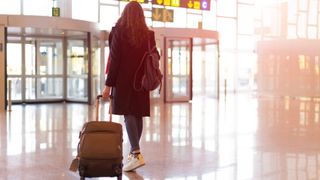How to eat healthy while traveling: 7 doctor-approved tips for when you're on the move
With sleep, exercise, and snacks tips, doctors reveal how to eat healthy while traveling


Wondering how to eat healthy while traveling? Considering the havoc that plane, train, and road travel can have on our bodies, you certainly won't be the only one.
Taking a vacation is a great way to free our minds from the stresses of daily life but straying from routine can have side effects. Typical problems include issues with digestion, muscle pain, headaches, and fatigue, especially for those who've been traveling for hours on end.
We've asked a panel of experts - including doctors, a dietitian, a physical therapist, and a pharmacist - to reveal how to avoid the more common concerns and how they stay healthy on the move, plus how to eat healthy while traveling. From how many calories you should eat for breakfast to stay full to the best foods to snack on, this is what they recommend doing on your next trip.
How to eat healthy while traveling
1. Add fruits and vegetables to your meals
This is probably the easiest tip to follow if you want to know how to eat healthy while traveling as, wherever you're going, there will likely be somewhere to purchase fruits and vegetables. If not and if you know about this in advance, you can bring your own.
"Adding a fruit or veggie to each of your meals will keep your fiber intake while also offering more nutrition," says Amanda Sauceda, a registered dietitian and gut health specialist. "As a bonus, keep some frozen veggies and fruits in your freezer so you have something easy when you come back."
As well as being nutritious, fruits like bananas, apples, and oranges, and vegetables such as broccoli, carrots, and avocado are high in dietary fiber, meaning they keep us fuller for longer without being too heavy in the stomach while we're on the move.

2. Stay hydrated
"Drink water and then some," warns Sauceda, who is also the creator of The Mindful Gut. "Dehydration is one of the biggest factors to having your digestion feel off, getting headaches, and just feeling overall blah on your travel days."
Sign up for the woman&home newsletter
Sign up to our free daily email for the latest royal and entertainment news, interesting opinion, expert advice on styling and beauty trends, and no-nonsense guides to the health and wellness questions you want answered.
This is a particularly important one if you're traveling by plane as the controlled air pressure has much lower humidity than we're used to on the ground. In planes, there's about 10 - 20% humidity, instead of 35% to 65%, which we normally have. The dryness in the air, which I'm sure we've all felt before on planes (hello, dry mouth), means we're likely to become dehydrated much faster, according to research by the University of Split.
Drinking water is also something that many of us tend to forget to do - or purposefully avoid when we travel, so it's something to be especially aware of. "Many people tend to cut back on their consumption of fluids on travel days to avoid needing a public restroom, which can be both hard to find and dirty. Many people are also unwilling to pay the premium that often comes with buying a beverage on the road. At airports and gas stations, an individual bottle of water can run as much as $4," says Dr Valerie Ulene, a general preventative medicine and public health specialist.
3. Don't skip meals
If it's an early flight, the idea of eating at 4 or 5 am may not sound appealing. But traveling or not, skipping breakfast is never a good idea. Having breakfast before you leave home means you won't have to pay for expensive food at the airport or eat something you'd otherwise avoid because of lacking options.
Not only this, but a review by Mahidol University suggests that skipping breakfast altogether can lead to feelings of fatigue and tiredness throughout the day - which isn't exactly the best way to start the holiday - and a much higher likelihood of overconsuming foods high in saturated fats and sugar. Calorie-wise, everyone will have different requirements, but around 500 calories of protein, carbohydrates, and fiber should keep you full for a few hours.
If you can't stomach eating early in the morning, choose something light like a banana and a milky coffee, such as a latte, or opt for elements of the low dopamine morning routine and focus on higher-protein, lighter foods.
Equally, if you're traveling in the evening, try not to skip dinner. Eating late at night can cause discomfort if you're then sat down for a few hours, but not eating at all can also cause issues like nausea and dizziness. Instead, the experts suggest aiming to eat about 30 minutes to two hours before you fly to allow for your food to digest.
4. Plan where to eat in advance
Luckily when it comes to traveling, almost all the information you'll need is online - including maps of the transport hub and surrounding areas. This means it's often easy to scope out the eating options available at your airport, train station, or even on the road before you arrive.
Take advantage of this if you have to buy your food on the move, the experts say, and plan where and what you're going to eat. This will help take another concern out of this (already stressful) day as you'll avoid wandering around looking for what you want and eventually opting for what's easiest, which is unlikely to be the most nutritious.
But superintendent pharmacist Jana Abelovska says it may also help you avoid one of the most common travel illnesses: food poisoning. "Food poisoning can be quite common when traveling. In particular, countries such as India, Indonesia, Thailand, and Peru record higher cases of food poisoning and stomach upsets in travelers. It’s a good idea to scope out a couple of dining options, rather than settling for the first one you find."

5. Avoid overeating
"While eating and drinking are a big part of many vacations, it’s best to enjoy them in moderation," says Dr Ulene, who is also the founder of Boom Home Medical. There are always so many food and drink options at travel hubs, it's easy to get a little carried away. Whether that's a big meal from the train's food cart or a few drinks before you board your flight, overeating or drinking can cause issues.
"For one thing, [it] usually leaves you feeling uncomfortable and sometimes even tired or sluggish, which is not what you’re after when you’re supposed to be enjoying yourself," she says.
Instead, Sauceda says, try to eat less and more often. "Smaller meals may be more beneficial if you know this is going to be a food-orientated trip anyway," she says. "Eating smaller meals more often will better allow you to get a taste of all the good food without overdoing it."
6. Pack snacks you've had before
If security will let you get away with it - and many are fine with passengers bringing food through - try to always pack your own snacks rather than shopping at the airport. Not only will this be cheaper but your body will thank you for it.
"Packs snacks that agree with your gut and can give you fuel when you need something in a pinch," says the dietitian. "Eating schedules can be hectic when traveling so having something in your bag is always a good idea."
7. Take a few deep breaths before eating
Often how we eat is an important factor in how our bodies respond to food. So, Sauceda says, if you're looking to know how to eat healthy while traveling, consider taking a moment to allow your body to recognize that it's about to consume food.
"It might seem like a small thing but it can help your gut to stay healthy because it puts your body in rest and digest mode," says Sauceda. "It's very easy to be stressed while traveling or caught up in the fun of the vacation."
7. Remember to move
When we're sat down for a while, as we often are when we're traveling, the body comes under stress. So, as much as it's important to know how to eat healthy while traveling, it's important to remember to move regularly and adjust your posture.
"Prolonged periods of sitting can lead to both muscular and mental fatigue," explains Dr Carrie Lamb, a physical therapist and Pilates instructor with qualifications in nutrition. "Taking breaks from sitting and, even better, trying to raise your heart rate can help combat these types of travel fatigue."
To do this, she suggests taking some time to walk, simple Pilates for beginners exercises, or do other easy cardio exercises when you get off the plane. "Even five to 10 minutes can help before you hop in a car, bus, or taxi to get to your final destination. If you are taking the train or subway, try to stand for a bit instead of sitting down. Your body will thank you."
This will keep your circulation going and deliver plenty of oxygen to your muscles and brain. "If you're traveling, you'll likely want to arrive with good energy to explore and engage with your destination, versus crashing in your room."

What's the best food to eat while traveling?
Ideally, when you travel, your nutrition habits should apply as normal. "Your diet should include a healthy mixture of complex carbohydrates, low-fat proteins, and fruits and vegetables," says Dr Ulene.
"But it's hard to eat healthily on travel days. At least in part because the food available for sale in airports and other transport hubs tends to be highly processed. Airport concession stands, for example, sell things like candy and chips, and airport restaurants serve super-sized portions of food high in fat, calories, and salt," she says. "[This is why it's best to] try and pack your own snacks and even meals for travel days whenever possible."
With digestive issues like constipation common in those who've been traveling, thanks to the switch-up in routine, Sauceda recommends packing prunes or sourcing some soon after arrival. "Prunes can help keep you regular on your trip," she explains, "There are some prunes that are single servings too, making them easy to toss into your bags."
Tips for staying healthy while traveling
- Stick to your normal eating routine before you go: "One of the best things you can do to help your digestion when traveling is to stick with your normal eating routine as much as possible for a couple of days before you leave," says dietitian Sauceda.
- Prioritize sleep: "Getting a solid night’s rest before you travel is always a good idea, but it’s particularly important if you’re changing time zones," says Dr Ulene. "Since it’s hard to get comfortable on long, overseas flights, it’s unlikely you’ll get much sleep en route to your destination and, chances are, you’ll arrive several hours behind on sleep. That’s all it takes for most people to start feeling the effects of missed sleep."
- Move even when you're sat down: "The body seems to respond best to frequent changes of posture instead of getting stuck in one position," says Dr Lamb. "Even when you're stuck sitting longer than you'd like to be, a little fidgeting goes a long way. Move what you can. Circle your feet and ankles, lift and lower your heels, roll your shoulders, rock your pelvis, whatever you need to do just to move a little."
- Wear comfortable clothes: "Wear clothes that allow you to move easily so you can frequently adjust your position," says Dr Lamb. This will also help you feel more comfortable after eating, especially if it was a larger meal and you've been sitting down for a while.
- Don't forget sunscreen: If you're only traveling for a few hours within an airport, you're unlikely to need this. But if you're going to spend any time outdoors, remember to pack at least one of the best facial sunscreens in your carry bag. “Use an appropriate-strength, in-date sunscreen whenever you’re outdoors, even if the weather is cloudy," says Abelovska, who works at Click Pharmacy.
- Take a few medications with you: "Take a few over-the-counter medications with you," suggests Dr Ulene, including remedies for hay fever. "Having a few over-the-counter medications on hand can make navigating these travel setbacks easier, without the need to locate a drug store in an unfamiliar city. Ibuprofen and acetaminophen, for example, can alleviate the pain of a minor injury or bring down a low-grade fever, while diphenhydramine (also called Benadryl) can help control allergies or alleviate itching. Of course, if any serious health issue arises while you’re away from home, it’s always important to seek out proper medical attention."

Grace Walsh is woman&home's Health Channel Editor, working across the areas of fitness, nutrition, sleep, mental health, relationships, and sex. She is also a qualified fitness instructor. In 2024, she will be taking on her second marathon in Rome, cycling from Manchester to London (350km) for charity, and qualifying as a certified personal trainer and nutrition coach.
A digital journalist with over six years experience as a writer and editor for UK publications, Grace has covered (almost) everything in the world of health and wellbeing with bylines in Cosmopolitan, Red, The i Paper, GoodtoKnow, and more.
-
 Kate Garraway spreads Christmas joy with rainbow checkerboard dress and pink heels
Kate Garraway spreads Christmas joy with rainbow checkerboard dress and pink heelsKate Garraway's patterned jumper dress reminded us that fabulous festive outfits can also be so cosy and comfortable
By Emma Shacklock Published
-
 Drew Barrymore says she ‘struggled so much’ mentally with perimenopause, revealing her unexpected symptoms
Drew Barrymore says she ‘struggled so much’ mentally with perimenopause, revealing her unexpected symptomsDrew Barrymore has opened up about the mental toll perimenopause has taken on her, explaining the barrage of symptoms she's been hit with since entering this phase.
By Lucy Wigley Published